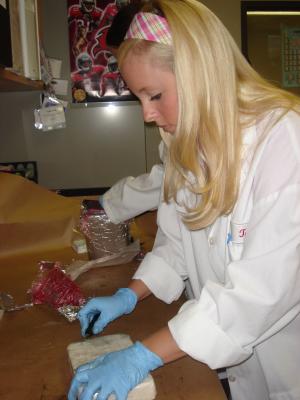My Forensic Science Undergraduate Experience So Far
by Julianne Johnson
(Laurinburg, NC, USA)

Spending a day in Drug Chemistry: Processing pure cocaine.
If I had to give one recommendation for any forensic science or related major, it would be to do an internship. This really was the most amazing experience I could possibly imagine, and I almost didn't even apply (what a mistake that would have been!).
It helped me to realize how many fields within the field of forensic science there are, and it helped me to find my niche.
I am currently a senior at a small private college near the coast of North Carolina, St. Andrews Presbyterian College, and I am majoring in Forensic Science with a concentration in Psychology. Our FS program has two routes you can take, the Psych route or the Chemistry route, and as much as I love science, I just knew I wasn't fit to take Organic, Inoraganic, Analytical Chem, and all those types of classes. I have definitely enjoyed the psych route, and don't regret not taking the Chem route.
My only concern before I began my internship was that I did not have the chemistry experience, but I found out that to be in a crime lab, you don't necessarily have to have all the chem experience. I received an internship with the North Carolina State Bureau of Investigation in their Crime Lab in the Latent Evidence Section. After taking a course here at school on the Henry Classification System, I knew my calling was with fingerprints. I was elated to be able to work in the Latent Evidence Section!
Over the course of 3 months, I put in about 400 hours of work: completed research on upcoming methods of latent print development, conducted an experiment on the use of Hydrogen Peroxide as a means of developing latent ridge detail on cartridge casings, updated the SICAR database with photographs of new off-brand shoes, processed a burnt car for latent prints, processed different types of evidence by means of chemical/non-chemical methods, gained experience on AFIS and IAFIS, and much much more!
What is so great about their crime lab is that some (but not all) positions are sworn. This means they have to complete Basic Law Enforcement Training, attend NC's Justice Academy, and go through extensive training. If you become sworn, you are then able to carry a firearm (along with badge)to crime scenes. Personally, I would enjoy the comfort of knowing I can protect myself if needed.
I now know what I really want to do with the rest of my life. The Special Agent in Charge of the Latent Evidence Section has asked me to come back, so now I just have to graduate and apply :)
GOOD LUCK TO EVERYONE ELSE LOOKING FOR THEIR NICHE :)
Comments for My Forensic Science Undergraduate Experience So Far
|
||
|
||